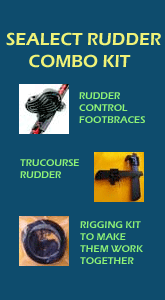
 Custom Search
|
| boat plans |
| canoe/kayak |
| electrical |
| epoxy/supplies |
| fasteners |
| gear |
| gift certificates |
| hardware |
| hatches/deckplates |
| media |
| paint/varnish |
| rope/line |
| rowing/sculling |
| sailmaking |
| sails |
| tools |
| join |
| home |
| indexes |
| classifieds |
| calendar |
| archives |
| about |
| links |
| Join Duckworks Get free newsletter CLICK HERE |
|
|
| Making a CD-Sextant |
From the duckworks archives by Paul C |
Now that the stars are out later in the morning, and the boats are all put away, it’s time to think of winter projects that will keep us busy.
On the flip side, we also grew up with a copy of Chapman’s “Piloting, Seamanship, and Small Boat Handling” for rainy-day reading. This provided a background for the theory of navigation, but I had no chance for experience. Later years brought “Safe Boating” classes that discussed navigation only briefly while spending much more time on the Rules of the Road, Lights, Buoys, and the like (all very important too!). Alas, any serious attempt to learn navigation was always stymied by the lack of a sextant. When raising four kids, a sextant was a luxury that did not fit the practical budget. Building small boats was a stretch on the budget as it was. Finally, all of this has changed! This year I found the plans for the CD-Sextant. And where else, but on the Internet!
The plans are detailed but construction is really straightforward. Now for the accumulation of the necessary parts. Small mirrors are difficult to find. A trip to Walgreens yielded a Maybelline compact on the “sale item” shelf. The college girl clerk did look at me funny when I explained what I was looking for and how I planned to use it. Upon returning home, heating the plastic housing ultimately loosened the glue which allowed the mirror to pop out. Construction went smoothly. The most difficult part being breaking the mirror in half and then the removal of the silvered portion from one half of that half. The line in the instructions regarding the slow scraping with a razor blade removed the silver nicely. If you are under 18, have an adult do it for you. The balance of the construction was very straightforward. Thankfully we still have a Lego bin at our house! Certainly small blocks of wood could easily have replaced the Legos. I used an exposed x-ray as the sun shield. I am not sure if this is particularly ideal since after all we are looking at the Sun! (All Standard Disclaimers!!! Don’t look at the sun. X-ray film is not an adequate filter! Looking at the sun DOES cause blindness!) Use this sextant to look at the moon and the stars! This is a cool instrument that does work! I am again a navigation student learning to use my sextant. I feel like the midshipmen mentioned above. Of course taking the sights from the same landlocked location does take some of the challenge out it. Besides the “deck” is not pitching. And it’s not like the consequences of being unable to verify your reading if we were out on the open sea. But, since I am being self taught, as long as I keep finding myself still at latitude 43 degrees, I guess I am doing it right! I continue taking sights on different objects at varying times of the day and night for practice (and fun). This brings me another step closer to being able to go to sea! There are numerous freeware and shareware navigation computer programs available to assist with the astronomical tables and the “navigation math.” While in the purist sense, this is cheating, it is also very helpful when you are being self taught. Do a Google ™ search on “Navigation + Freeware” and “Navigation + Shareware.” Bowditch is another excellent source of traditional navigation instruction. Hopefully a copy can be found at your public library. This is a fun, practical and not particularly complicated project. Done step by step, it goes very smoothly. Plans are at: “The CD-Sextant Build Your Own Sextant.” I would like to thank the author for his creative offering! Try it out on your next rainy day!
|
To comment on Duckworks articles, please visit one of the following:
|
 |


 While
I am a “land locked” sailor, mostly confined to
Michigan’s inland lakes, navigating the oceans has always
intrigued me. And, while I no longer see quite the allure of
Tahiti, exploring the Caribbean is still a “goal”
that is out there! To properly cruise the Caribbean, one really
needs to know how to navigate. As a kid growing up, we read
the adventures of Hornblower. When a midshipman, he was taught
the seamanlike skills, of which navigating was a significant
part. The tales of Hornblower and his fellow messmates made
navigation seem a truly difficult art.
While
I am a “land locked” sailor, mostly confined to
Michigan’s inland lakes, navigating the oceans has always
intrigued me. And, while I no longer see quite the allure of
Tahiti, exploring the Caribbean is still a “goal”
that is out there! To properly cruise the Caribbean, one really
needs to know how to navigate. As a kid growing up, we read
the adventures of Hornblower. When a midshipman, he was taught
the seamanlike skills, of which navigating was a significant
part. The tales of Hornblower and his fellow messmates made
navigation seem a truly difficult art.


